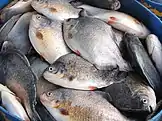Portal:Agriculture/Selected article/5
Fish farming is the principal form of aquaculture, while other methods may fall under mariculture. Fish farming involves raising fish commercially in tanks or enclosures, usually for food. A facility that releases young (juvenile) fish into the wild for recreational fishing or to supplement a species' natural numbers is generally referred to as a fish hatchery. The most common fish species raised by fish farms are salmon, carp, tilapia, European seabass, catfish and cod.

There is an increasing demand for fish and fish protein, which has resulted in widespread overfishing in wild fisheries. Fish farming offers fish marketers another source. However, farming carnivorous fish, such as salmon, does not always reduce pressure on wild fisheries, since carnivorous farmed fish are usually fed fishmeal and fish oil extracted from wild forage fish. In this way, the salmon can consume in weight more wild fish than they weigh themselves. The global returns for fish farming recorded by the FAO in 2008 totalled 33.8 million tonnes worth about $US 60 billion. (Full article...)